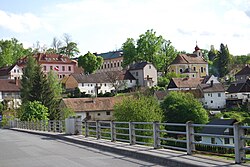| Liblín | |
|---|---|
| Market town | |
 View from the northeast View from the northeast | |
 Flag Flag Coat of arms Coat of arms | |
 | |
| Coordinates: 49°55′0″N 13°32′39″E / 49.91667°N 13.54417°E / 49.91667; 13.54417 | |
| Country | |
| Region | Plzeň |
| District | Rokycany |
| First mentioned | 1180 |
| Area | |
| • Total | 6.05 km (2.34 sq mi) |
| Elevation | 312 m (1,024 ft) |
| Population | |
| • Total | 252 |
| • Density | 42/km (110/sq mi) |
| Time zone | UTC+1 (CET) |
| • Summer (DST) | UTC+2 (CEST) |
| Postal code | 331 41 |
| Website | www |
Liblín is a market town in Rokycany District in the Plzeň Region of the Czech Republic. It has about 300 inhabitants.
Geography
Liblín is located about 19 kilometres (12 mi) north of Rokycany and 22 km (14 mi) northeast of Plzeň. It lies in the Plasy Uplands. The highest point is the hill Na Mýti at 432 m (1,417 ft) above sea level. The municipality is situated on the right bank of the Berounka River; the village is situated in its meander. The Střela River joins the Berounka on the municipal border of Liblín.
History
The first written mention of Liblín is from 1180. In the second half of the 14th century, the Libštejn Castle was built near Liblín and then was bought by the Kolowrat family. The village became part of the Libštejn estate at the turn of the 14th and 15th centuries. During the Hussite Wars, Liblín was repeatedly damaged and looted. In 1510, the Libštejn estate was acquired by the Waldstein family. At the beginning of the 17th century, the estate was bought by the Gryspek family. During the Thirty Years' War, Liblín was again repeatedly looted. A new period of prosperity began in the 18th century, when a new Baroque castle was built.
In 1904, Liblín was promoted to a market town.
Demographics
|
|
| ||||||||||||||||||||||||||||||||||||||||||||||||||||||
| Source: Censuses | ||||||||||||||||||||||||||||||||||||||||||||||||||||||||
Transport
There are no railways or major roads passing through the municipality.
Sights

The main landmarks of Liblín are the Liblín Castle and the Church of Saint John of Nepomuk. The castle was built in the late Baroque style in 1721–1725 on the site of an old Renaissance fortress. In 1845, it was modified in the Neoclasical style into its present form. Today it houses an institute of social welfare. The church was built in the castle complex in 1751–1752. Next to the castle is a park with three valuable statues of saints Joseph, Gotthard and John the Evangelist.
A tourist destination is the ruin of the Libštejn Castle. The castle was documented as abandoned in 1590 and definitively fell into disrepair during the Thirty Years' War.
A technical monument is the reinforced concrete arch road bridge that spans over the Berounka. It dates from 1929.
Notable people
- Charles Pergler (1882–1954), diplomat and lawyer
References
- "Population of Municipalities – 1 January 2024". Czech Statistical Office. 2024-05-17.
- "Historie obce" (in Czech). Městys Liblín. Retrieved 2024-03-27.
- "Rozvojový strategický plán obce Liblín" (PDF) (in Czech). Městys Liblín. 2012-03-20. p. 4. Retrieved 2024-03-28.
- "Historický lexikon obcí České republiky 1869–2011" (in Czech). Czech Statistical Office. 2015-12-21.
- "Population Census 2021: Population by sex". Public Database. Czech Statistical Office. 2021-03-27.
- "Zámek" (in Czech). National Heritage Institute. Retrieved 2024-03-27.
- "Zřícenina hradu Libštejn" (in Czech). National Heritage Institute. Retrieved 2024-03-27.
- "Silniční most" (in Czech). National Heritage Institute. Retrieved 2024-03-27.